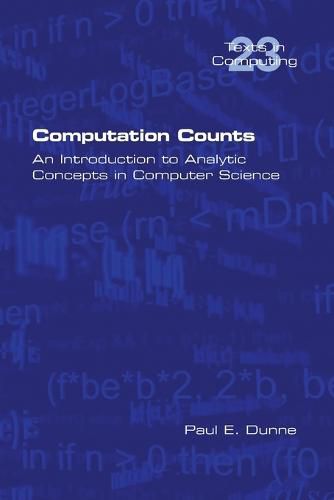Readings Newsletter
Become a Readings Member to make your shopping experience even easier.
Sign in or sign up for free!
You’re not far away from qualifying for FREE standard shipping within Australia
You’ve qualified for FREE standard shipping within Australia
The cart is loading…






This title is printed to order. This book may have been self-published. If so, we cannot guarantee the quality of the content. In the main most books will have gone through the editing process however some may not. We therefore suggest that you be aware of this before ordering this book. If in doubt check either the author or publisher’s details as we are unable to accept any returns unless they are faulty. Please contact us if you have any questions.
This book provides an introduction to several mathematical topics of importance in Computer Science but often considered to be outside the scope of traditional Discrete Methods courses. It offers basic treatments of Calculus, Complex Numbers, Statistics, and Linear Algebra with a particular emphasis on Spectral Methods.
The presentation is intended for students with minimal mathematical background. Its principal aim being to emphasize the significant applications in modern CS for which some awareness of these fields is essential, e.g. Machine Learning, Data Science, Computational Game Theory, and Optimization. The focus is, therefore, directed towards applications in CS rather than detailed mathematical exposition.
About the author: Paul Dunne is a Professor of CS at the University of Liverpool where he has worked since 1985. He studied CS at the University of Edinburgh (1977-1981) and completed his PhD research at Warwick University (1981-1984). In his time at Liverpool he has had experience in teaching all levels of undergraduate from first year through to Honours year presenting courses on Computability and Complexity Theory, Algorithms, Operating Systems, and the topic of the present book. He has published research in a range of fields from Boolean Function complexity, phase transition phenomena, AI and Law, complexity in multiagent systems, and has recently been most active in the area of models of Computational Argument.
$9.00 standard shipping within Australia
FREE standard shipping within Australia for orders over $100.00
Express & International shipping calculated at checkout
This title is printed to order. This book may have been self-published. If so, we cannot guarantee the quality of the content. In the main most books will have gone through the editing process however some may not. We therefore suggest that you be aware of this before ordering this book. If in doubt check either the author or publisher’s details as we are unable to accept any returns unless they are faulty. Please contact us if you have any questions.
This book provides an introduction to several mathematical topics of importance in Computer Science but often considered to be outside the scope of traditional Discrete Methods courses. It offers basic treatments of Calculus, Complex Numbers, Statistics, and Linear Algebra with a particular emphasis on Spectral Methods.
The presentation is intended for students with minimal mathematical background. Its principal aim being to emphasize the significant applications in modern CS for which some awareness of these fields is essential, e.g. Machine Learning, Data Science, Computational Game Theory, and Optimization. The focus is, therefore, directed towards applications in CS rather than detailed mathematical exposition.
About the author: Paul Dunne is a Professor of CS at the University of Liverpool where he has worked since 1985. He studied CS at the University of Edinburgh (1977-1981) and completed his PhD research at Warwick University (1981-1984). In his time at Liverpool he has had experience in teaching all levels of undergraduate from first year through to Honours year presenting courses on Computability and Complexity Theory, Algorithms, Operating Systems, and the topic of the present book. He has published research in a range of fields from Boolean Function complexity, phase transition phenomena, AI and Law, complexity in multiagent systems, and has recently been most active in the area of models of Computational Argument.